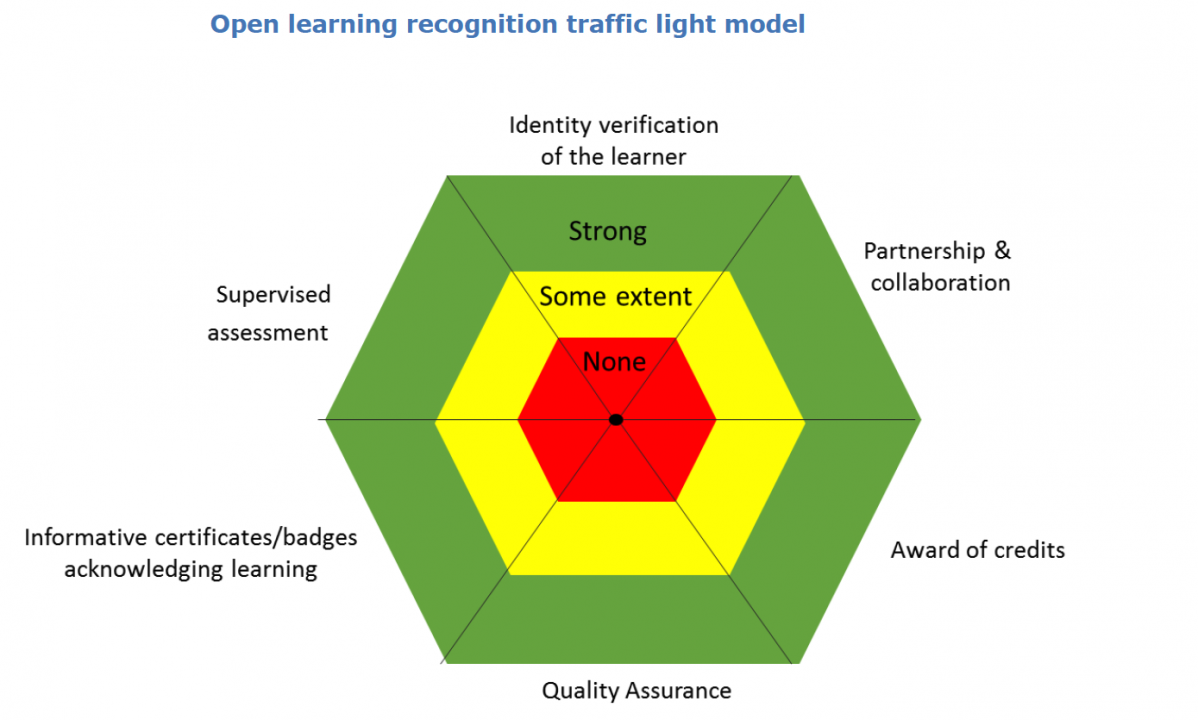Validation of Non-formal MOOC-based Learning: Credits for MOOCs?
The European Commission has published a report on Validation of Non-formal MOOC-based Learning. The report is an outcome of the OpenCred study, which was carried out collaboratively by the ICT for Learning and Skills team of JRC IPTS, researchers of the University of Leicester, and consultants:
This report presents the outcomes of research, conducted between May 2014 and November 2015, into emerging practices in assessment, credentialisation and recognition in Massive Open Online Courses (MOOCs). Following extensive research on MOOCs in European Member States, it provides a snapshot of how European Higher Education Institutions (HEIs) recognise (or not) non-formal learning (particularly MOOC-based), and how some employers recognise open badges and MOOC certificates for continuing professional development. We analyse the relationship between forms of assessment used and credentials awarded, from badges for self-assessment to ECTS credits for on-site examinations, and consider the implications for recognition. Case studies provide deeper insights into existing practices. The report introduces a model which guides MOOC conveners in positioning and shaping their offers, and also helps institutions and employers to make recognition decisions. It concludes with a set of recommendations to European HEIs and policy makers to enable wider recognition of open learning in higher education and at the workplace.
One of the interesting items of report is open learning recognition traffic light model. The model describes elements of non-formal, open learning assessment using a “traffic light” metaphor:

Key to colours:
- Red - the element is not part of the open educational offer
- Yellow - the element is to some extent part of the open educational offer
- Green - the element is a strongly addressed by the open educational offer
The model shows if a course is suitable for recognition. According to the authors the model can be used for:
- Providers of non-formal, open learning and MOOCs to design their offers in such a way that credentials awarded to learners are more easily recognised in the future.
- HEIs and employers to help them in their strategic planning as regards their recognition of credentials from any given MOOC or open learning offer.
- Learners, who wish to gain recognition for their learning, to help them decide whether a given open learning offer is suitable.
The research identified five barriers to recognise MOOCs:
- Perceived lower value of online assessments and proctoring
- Lack of integration of open learning with existing mechanisms and strategies for student mobility and recognition of prior learning (RPL)
- Tension between affordability and future recognition in the provision of open learning
- Unbundling of learning provision, (supervised) assessment and credentialisation pose a challenge to existing HEI regulations
- Little guidance for MOOC learners on potential recognition options
In the report they also have some recommendations:
To higher education institutions
- Validate open learning by offering credentials for MOOCs and free and open online courses
- Provide flexible options for 'free elective courses' or 'self-study courses' in the curricula, including open learning for study progression
To institutions offering MOOCs or other forms of open education
- Provide transparent information to learners and potential recognising institutions/ employers that could recognize this type of learning using the OpenCred model.
- Join European consortia and build partnerships with HEIs and employers/employment bodies
- Explore ways in which (open) learners can become eligible for assessment and ECTS credits through non-bureaucratic procedures
Credits for MOOCs
The Credits for MOOCs initiative, TU Delft started it with a couple other universities, is addressing a lot of these issues and is following some of the recommendations. In the Open Education Week we organise a workshop with the universities to discuss the next steps.
Reference
Witthaus, G., Inamorato dos Santos. A., Childs, M., Tannhäuser, A., Conole, G., Nkuyubwatsi, B., Punie, Y. (2016) Validation of Non-formal MOOC-based Learning: An Analysis of Assessment and Recognition Practices in Europe (OpenCred). EUR 27660 EN; doi:10.2791/809371
No feedback yet
Form is loading...